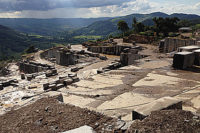“All we do, and all we want to do, is obtain quarries in North America,” said François Darmayan, President and General Manager of Polycor. “We already have quarries in Georgia, Colorado and Canada — so it’s [Alberene] right in our way. Right in what we do. We only quarry in the U.S. and Canada, so we saw the stone at different trade shows and our sales people fell in love with it. We first looked at it, and we thought it would be better quarrying it [rather than outsourcing overseas].”
The Alberene Soapstone Co. – the oldest quarry in the U.S. – was founded in 1888. It was one of the largest and most operational quarries of the 1900s, employing around 3,000 workers at one time. In 1950, Georgia Marble, a company that specializes in all types of American marble, now a division of Polycor, purchased the site and successfully operated it until 1975. As a result of Hurricane Camille in August of 1969, the site was flooded and almost destroyed, forcing the owners to scale back dramatically on production and workers until the site ultimately closed down a handful of years later.
After Georgia Marble, the site was essentially dormant for more than 10 years until purchased by the Finnish company, Tulikivi (Swedish for “fire stone”), which specializes in soapstone masonry heaters, and was looking to bring its market to the U.S.
“They came here with the mindset of, ‘If it works in Europe, it’ll work in the U.S.,’” said Darmayan. “However, the market [for soapstone heaters] was too small in the U.S. so it failed. When they realized it was too small of a market in the U.S., they sold it to a local group of people that didn’t quarry and just did small projects. Nothing really happened for 10 years and that’s when a local group of investors came in.”
In 2010, the investors, from Charlottesville, VA, tried to reopen the quarry. “They looked at what people use stone for nowadays,” said Darmayan. “They went to a couple of trade shows and that’s how we met. It was an entrepreneurial restart — no stone experience. I’d just like to continue the work.”
Though Polycor usually works with marble, granite and limestone, it wanted to expand its product list to include soapstone because of the newfound demand for the bluish-gray metamorphic rock, which can be used for a variety of applications, including countertops, window sills, radiant flooring, electrical components, masonry heaters, and even patios and pool surrounds.
“At Polycor, we constantly seek to provide solutions for the built environment through diversity of products and offerings,” said Darmayan. “Bringing the Alberene Quarry into the Polycor family expands opportunities for fabricators, architects, designers, contractors and end users to use a beautiful, durable and domestically sourced material in their upcoming projects.”
In addition to its favorable aesthetic qualities — the soft, soapy feel — soapstone is impenetrable; nonporous; resistant to bacteria, stains, burns; and has the best thermal properties of all natural materials, currently making it a desirable stone in the U.S.
“There is a large demand now, and the only other country that produces slabs is Brazil,” said Darmayan. “There is more demand than we can produce. Stone countertops are still very popular, and I guess the market gets tired of polished granite after a while, which you see everywhere now. So, people look for other material and soapstone is great because of its resistance to stains, which is what makes it very popular. It’s very soft when you touch it, and it has a very different feel than a granite countertop.”
And since it’s a highly desirable product without many origins, Polycor has a leg up now that it offers its customers a local supply, opposed to having to outsource overseas. “Some people do care that it comes from a local area, and that’s the same for all of our stone,” said Darmayan. “We never import. The customers we sell to import, but now our customers have a choice to import soapstone from other countries or buy soapstone from us from Virginia, and usually they do both. The main point is that consumers now have a choice.”
The quarrying operation
Polycor has been making changes to the Alberene site to accommodate its current business, but has been steadily quarrying for a couple of months now. “We are pulling rocks every day, small in volume,” said Darmayan. “With the backload and demand, we have to quarry between five and six times faster than [the prior owners] were quarrying. There was a very limited operation before with a few people; they had to open the quarries and the plant, so they spent a lot of energy putting together a factory. We have slab factories in Georgia and Quebec, so what we really concentrate on is the quarry. Onsite are 15 people, and we’re bringing on more equipment. It’s almost like opening up a quarry because the prior owners did very limited work.”
Polycor’s extraction method is very similar to that of marble quarrying, and requires no explosives or dynamite — everything is cut with diamond wire and water. Workers have been using a Volvo excavator, Pellegrini diamond wire saw, Fantini chain saw and Caterpillar loader for extraction.
To extract the soapstone, workers cut large benches out of the mountain, measuring 30 x 30 x 5 feet, turn over slabs and look at the old defects and cracks, and then cut blocks out of the big slabs around problem areas and cracks. Those large blocks, which weigh between 46,000 and 48,000 pounds, are then sent to one of Polycor’s factories and subsequently sold to distributors.
“It’s exactly like any marble quarry in the world,” said Darmayan.
Another one of Polycor’s main goals is to utilize the majority of, if not all, the stone it quarries throughout its sites, including Alberene. “For every quarry we have, our goal is always to transform as much as we can from what we excavate to a finished product,” said Darmayan. “We strive to utilize everything we quarry. Some quarries we aggregate so we don’t waste. Every possible product the market wants in one given stone we will try to make. If there’s a local market for aggregates, we’ll crush stone we can’t use and aggregate so there is no waste at all.”
Between its eco-friendly objectives, local-driven goals and recent acquisition of the Alberene Soapstone Co., Polycor is continuing to strengthen its mission to promote the natural stone of North America one quarry at a time.





